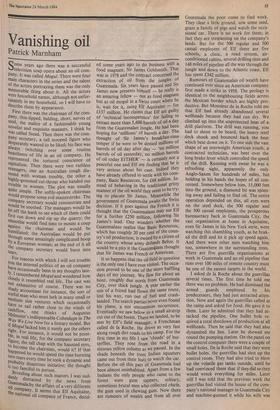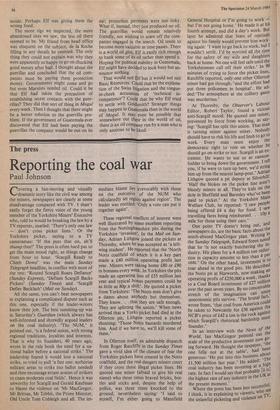Vanishing oil
Patrick Marnham
Some years ago there was a successful television soap opera about an oil com- pany. It was called Mogul. There were four
main characters in the series and the talent of the actors portraying them was the only memorable thing about it. All the actors were household names, although not unfor- tunately in my household, so I will have to describe them by appearance.
First there was the chairman of the com- Pany, thin-lipped, balding, short, nerves of steel, the malice of a fashionable young novelist and exquisite manners. I think he was called Stead. Then there was the com- Pany secretary, a tall stooped figure who desperately wanted to be liked; his face was always twitching over some routine beastliness of life in an oil company. He represented the tortured conscience of capitalism. Then there were two ruthless managers, one an Australian rough dia- mond with woman trouble, the other a highly-groomed cut-throat who handed out trouble to women. The plot was usually quite simple. The softly-spoken chairman would propose some evil masterstroke. The company secretary would remonstrate and would be soothed. The managers would be let off the leash to see which of them could first run down and rip up the quarry; the smoothie would find time to mount a coup against the chairman and would be humiliated; the Australian would be put through some amazingly complicated hoop by a European woman; at the end of it all
the company secretary would burst into tears.
For reasons with which I will not trouble You the internal politics of an oil company have occasionally been in my thoughts late- ly. I remembered Mogul and wondered how closely it resembled real life. The cast was not exhaustive of course. There was no shady accountant for instance, the sort of useful man who must lurk in many small or medium size ventures which occasionally have to sail rather close to the winds of cashflow, one thinks of Augustus Melmotte's indispensable Cohenlupe in The Way We Live Now for a literary model. But if Mogul lacked him it surely got the others right. For instance, it would not be possi- ble, in real life, for the company secretary figure, the tall chap with the haunted eyes, to become the chairman, would it? If that happened he would spend the time bursting into tears every time he took a dynamic and probably disastrous initiative; the thought is too fanciful to puruse. Brooding about such matters I was sud- denly distracted by the news from Guatemala,by the affairs of a very different oil company. It seems that Elf Aquitaine, the national oil company of France, decid-
ed some years ago to do business with a food magnate, Sir James Goldsmith. That was in 1978 and the contract concerned the extraction of oil from the jungles of Guatemala. Six years have passed and Sir James now presents himself —
he really is an amazing fellow — not as food magnate but as oil mogul in a Swiss court where he is, wait for it, suing Elf Aquitaine — for £137 million. He claims that Elf are guilty of 'technical incompetence' for failing to extract more than 5,600 barrels of oil a day from the Guatemalan jungle. He had been hoping for 'millions' of barrels a day. The thought of Sir James's breakfast-time temper if he were to be denied millions of barrels of oil day after day 'no million barrels of oil yesterday, no million barrels of oil today EITHER' — is certainly not a i peaceful one and Elf are finding that he is very serious about his case. Indeed they have already offered to settle with his com- pany, Basic Resources, for £68 million. In- stead of behaving in the traditional gritty manner of the oil world they seem to be try- ing to placate Sir James. Meanwhile the government of Guatemala awaits the Swiss decision. If it goes against the French it is thought that the Guatemalans may sue Elf for a further £250 million, following Sir James's lead. One wonders whether the Guatemalans realise that Basic Resources, which has roughly 20 per cent of the coun- try's oil production, is owned by a citizen of the country whose army defers Belize. It would be a pity it the Guatem lans thought that Sir James was French or American.
It so happens that the oil field in question is the only one I have ever visited. The occa- sion proved to be one of the more baffling days of my journey. We flew for about an hour, roughly due north from Guatemala City, over thick jungle, A year earlier the son of a friend had flown the same route, lost his way, run out of fuel and crash- landed. The search parties never even found his plane, a not uncommon occurrence.
Eventually we saw below us a small airstrip cut out of the forest. There we landed, to be met by Elf's field manager, a Frenchman called de la Roche. He drove us very fast along rough dirt roads to his camp. For the first time in my life I saw 'clouds' of but- terflies. They rose from the road in a sinuous yellow column as we passed. In the shade beneath the trees Indian squatters came out from their huts to watch the car. Before the oil this part of Guatemala had been almost uninhabited. Apart from a few Indians the only people who came to the forest were gum tappers, solitary, sometimes brutal men who collected chicle, the gum used in chewing gum. Now there are rumours of wealth and from all over Guatemala the poor come to find work. They clear a little ground, sow some seed, graze a family of pigs and watch the occa- sional car. There is no work for them; in fact they are trespassing on the company's lands. But for the 500 regular and 500 casual employees of Elf there are five schools, a clinic, a road system, air- conditioned cabins, several drilling sites and 148 miles of pipeline all the way through the jungle and down to the Atlantic coast. Elf has spent £342 million.
Rumours of Guatemalan oil wealth have continued ever since an American company first made a strike in 1958. The geology is identical to the neighbouring fields across the Mexican border which are highly pro- ductive. But Monsieur de la Roche told me that Elf had already abandoned several wellheads because they had run dry. We climbed up into the unprotected heat of a drill platform. The drill was running, you had to shout to be heard, the heavy steel deck shook and bounced back the heat which beat down on it. To one side the vast shape of an overweight American youth, a contracted technician, was bent over the long brake lever which controlled the speed of the drill. Running with sweat he was a refreshing sight, apparently the only Anglo-Saxon for hundreds of miles, but holding in his hands the hopes of all con- cerned. Somewhere below him, 15,000 feet into the ground, a diamond bit was spinn- ing away and failing to find oil. The entire operation depended on this, all eyes were on the steel deck, the 500 regular and the 500 casual employees, the prosperous bureaucracy back in Guatemala City, the vast organisation at home in Aquitaine, even Sir James in his New York eerie, were watching this shambling youth, as he brak- ed the drill and let it pick up speed again. And there were other men watching him too, somewhere in the surrounding trees. There are five guerrilla organisations at work in Guatemala and an oil pipeline that runs over 100 miles of remote country must be one of the easiest targets in the world.
I asked de la Roche about the guerrillas several times. The first time he told me there was no problem. He had dismissed the armed guards employed by his predecessors, they had just attracted atten- tion. Now and again the guerrillas called at the camp and asked for food. He gave it to them. Later he admitted that they had at- tacked the pipeline. One bullet hole re- quired a total shutdown of production at all wellheads. Then he said that they had also dynamited the line. Later he showed me round the pumping station. On the panel on the control computer there were a couple of small holes. De la Roche said that they were
bullet holes, the guerrillas had shot up the control room. They had also tried to blow
up the volatile gas tanks outside, until he
had convinced them that if they did so they would wreck everything for miles. Later still I was told that the previous week the guerrillas had visited the house of the com- pany's national manager in Guatemala City and machine-gunned it while his wife was
inside. Perhaps Elf was giving them the wrong food.
The more rigs we inspected, the more abandoned sites we saw, the less oil there seemed to be. My friend from head office was eloquent on the subject, de la Roche filling in any details he omitted. The only thing they could not explain was why they were apparently so happy to go on chucking good money after bad. I thought about the guerillas and concluded that the oil com- panies must be paying them protection money. Governments might come and go but even Marxists needed oil. Could it be that Elf had taken the precaution of establishing secret contacts with the guer- rillas? They did that sort of thing in Mogul every week. Then I thought that there might be a better solution to the guerrilla pro- blem. If the government of Guatemala ever discovered that Elf had been paying the guerrillas the company would be out on its
ear; protection payments were too risky. What if, instead, they just produced no oil. The guerrillas would remain relatively friendly, not wishing to scare off the com- panies engaged in the search. Oil tends to become more valuable as time passes. There is a world oil glut. Elf is easily rich enough to bank some of its oil rather than spend it. Hoping for political stability in Guatemala, Elf might have decided to look busy but an- nounce nothing.
That would suit Elf but it would not suit Basic Resources. Could that be the explana- tion of the Swiss litigation and the tongue- in-cheek accusation of 'technical in- competence'? Could that be why Elf tried to settle with Goldsmith? Stranger things may happen in Guatemala than in the world of Mogul. It may even be possible that somewhere out there in the world of oil, there is an oil company run by a man who is only anxious to be liked.











































 Previous page
Previous page